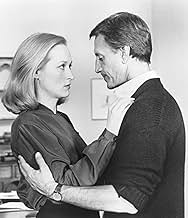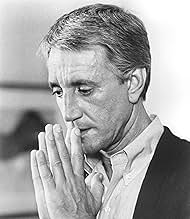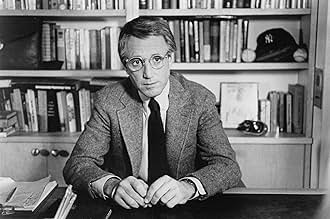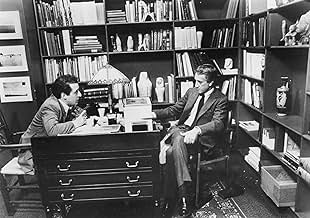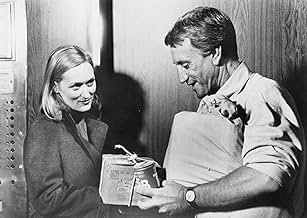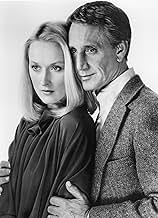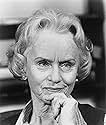IMDb-BEWERTUNG
6,0/10
6955
IHRE BEWERTUNG
Ein Psychiater aus Manhattan untersucht den Mord an einem Patienten und verfällt der mysteriösen Geliebten des Opfers.Ein Psychiater aus Manhattan untersucht den Mord an einem Patienten und verfällt der mysteriösen Geliebten des Opfers.Ein Psychiater aus Manhattan untersucht den Mord an einem Patienten und verfällt der mysteriösen Geliebten des Opfers.
- Auszeichnungen
- 2 Nominierungen insgesamt
Frederikke Borge
- Heather Wilson
- (as Rikke Borge)
Randy Jurgensen
- Car Thief
- (as Randy Jurgenson)
Empfohlene Bewertungen
Convoluted suspenser that showcases both Scheider and Streep. It's not a flick to tune in and out of. The plot's tricky, with a number of flashbacks that got somewhat confusing for me. Anyway, Scheider's an emotionally detached psychiatrist who's slowly unwound by the mysterious Streep as he delves further into the stabbing death of her lover and his former patient, Bynum. Scheider's convincing as Dr. Rice whose emotions are hidden behind a professional demeanor. Doing that meaningfully, as Scheider does, strikes me as challenging for any actor. Meanwhile, Streep also scores as the emotionally troubled Brooke, who appears the obvious culprit in Bynum's murder. Crucially, however, it's hard to tell what's going on behind that unstable outer woman. Together, the two characters are little short of riveting as they interact in ambivalent fashion. Also look for renowned actress Jessica Tandy as Rice's sober-sided mother in what appears a tacked-on role that's nevertheless well played.
Though the screenplay's murky, perhaps appropriately so, there're a number of grabber scenes, like the dream sequence with the sinister little girl or Rice's walk into Central Park. However, the climax appears clumsily contrived in order to get a conventional ending. Too bad, since the movie's mood and well-placed ambiguities deserve better. All in all, it's an intriguing movie that remains a testament to its two leads.
Though the screenplay's murky, perhaps appropriately so, there're a number of grabber scenes, like the dream sequence with the sinister little girl or Rice's walk into Central Park. However, the climax appears clumsily contrived in order to get a conventional ending. Too bad, since the movie's mood and well-placed ambiguities deserve better. All in all, it's an intriguing movie that remains a testament to its two leads.
"Still of the Night" is one of the more obscure entries in Meryl Streep's filmography, even though it came out in 1982 in between two of her greatest films, "The French Lieutenant's Woman" and "Sophie's Choice". (Until it turned up recently on British television I had never previously seen it or even heard of it). It is a psychological thriller, directed by Robert Benton who had earlier directed Meryl in "Kramer v Kramer". It has often been described as having been influenced by the works of Alfred Hitchcock, and one of the obvious signs of this influence is the fact that the main character, like the heroine of "Spellbound", is a psychiatrist. (Hitchcock was fascinated by psychology and psychiatry, and often makes reference to them in his films).
Another Hitchcock touch is the idea of the "man in the street" who suddenly finds himself in trouble or in danger. When one of his patients is murdered Dr Sam Rice, a Manhattan psychiatrist, finds himself becoming emotionally involved with a young woman named Brooke Reynolds, who was not only a colleague of the dead man but also his mistress, and who is also a suspect in his murder. The plot is a complex one, involving Rice falling under suspicion with the police, who believe that he may be withholding evidence about the killing, and his placing himself in danger by his own attempts to solve the crime.
The film makes quite deliberate reference to a number of Hitchcock films. Besides the general psychiatric theme, there is also a dream sequence reminiscent of the one in "Spellbound". The appearance of a bird during this sequence is a reference to "The Birds" and possibly also to "Psycho", where Norman's hobby is stuffing birds. A fall from a bell tower recalls "Vertigo" and, as in "North by North West", there is a scene set in an auction room. (The murdered man, George Bynum, was a senior employee of an auction house). There are also scenes reminiscent of "Rear Window" and "Marnie". Jessica Tandy who plays Rice's mother (also a psychiatrist) appeared in "The Birds". Many of Hitchcock's films, including "Notorious", "Strangers on a Train" and "Psycho", feature a strong, dominant mother-figure.
Perhaps the most effective Hitchcock touch is the use of a trademark blonde heroine. Although this is far from being one of Meryl Streep's greatest films, she nevertheless gives a very accomplished performance as Brooke, portraying a woman who is clearly disturbed and frightened and who might just also be a psychopath, while leaving (as the conventions of the thriller genre require) that second point open to doubt. Had Meryl been twenty years older, she might have become one of the Master's great muses, along with the likes of Ingrid Bergman and Grace Kelly.
And yet any number of Hitchcock references do not in themselves make a Hitchcock film. "Still of the Night" falls along way short of the great man at his best, or even at his second-best. Roy Scheider does not make a very charismatic hero and, except perhaps in the final sequences, Benton never succeeds in generating the sort of nail-biting tension that Hitchcock was so skilled at conjuring up, even in some of his lesser films. Whereas Hitchcock could normally relieve that tension with some effective use of humour, "Still of the Night" is a pedestrian and humourless film, no more than an average eighties thriller. 5/10, largely for Streep's performance.
Another Hitchcock touch is the idea of the "man in the street" who suddenly finds himself in trouble or in danger. When one of his patients is murdered Dr Sam Rice, a Manhattan psychiatrist, finds himself becoming emotionally involved with a young woman named Brooke Reynolds, who was not only a colleague of the dead man but also his mistress, and who is also a suspect in his murder. The plot is a complex one, involving Rice falling under suspicion with the police, who believe that he may be withholding evidence about the killing, and his placing himself in danger by his own attempts to solve the crime.
The film makes quite deliberate reference to a number of Hitchcock films. Besides the general psychiatric theme, there is also a dream sequence reminiscent of the one in "Spellbound". The appearance of a bird during this sequence is a reference to "The Birds" and possibly also to "Psycho", where Norman's hobby is stuffing birds. A fall from a bell tower recalls "Vertigo" and, as in "North by North West", there is a scene set in an auction room. (The murdered man, George Bynum, was a senior employee of an auction house). There are also scenes reminiscent of "Rear Window" and "Marnie". Jessica Tandy who plays Rice's mother (also a psychiatrist) appeared in "The Birds". Many of Hitchcock's films, including "Notorious", "Strangers on a Train" and "Psycho", feature a strong, dominant mother-figure.
Perhaps the most effective Hitchcock touch is the use of a trademark blonde heroine. Although this is far from being one of Meryl Streep's greatest films, she nevertheless gives a very accomplished performance as Brooke, portraying a woman who is clearly disturbed and frightened and who might just also be a psychopath, while leaving (as the conventions of the thriller genre require) that second point open to doubt. Had Meryl been twenty years older, she might have become one of the Master's great muses, along with the likes of Ingrid Bergman and Grace Kelly.
And yet any number of Hitchcock references do not in themselves make a Hitchcock film. "Still of the Night" falls along way short of the great man at his best, or even at his second-best. Roy Scheider does not make a very charismatic hero and, except perhaps in the final sequences, Benton never succeeds in generating the sort of nail-biting tension that Hitchcock was so skilled at conjuring up, even in some of his lesser films. Whereas Hitchcock could normally relieve that tension with some effective use of humour, "Still of the Night" is a pedestrian and humourless film, no more than an average eighties thriller. 5/10, largely for Streep's performance.
I remember being entirely taken with this film, seeing it several times when it was originally in theaters, way back in '82. Its creator, Robert Benton, freely admitted at the time that he intended this to be an homage to Hitchcock, and he's largely succeeded, right down to the cool, mysterious blonde female with a troubled past and the detective who is drawn to her, and the balletic, deliberate pacing that accentuates the suspense and tension, almost to a fault. Unlike Hitchcock, this film is strictly serious business, with nary a moment of lightness, which, alas, means something less than 'fun'. Hitchcock ALWAYS utilized humor, no matter how dark it may have been, recognizing that it, too, can actually heighten the suspense by putting people off their guard. This film would be richer for that sense but still it remains a good, solid mystery. As I've said, the story is pure Hitchcock: a murder takes place and a cool, mysterious blonde (Streep) may be the prime suspect, something that draws New York City psychologist (and amateur sleuth) Scheider towards her. One comment here said, "They don't make 'em classy like this anymore" and he couldn't be more right: from the restrained, low-key performance of Streep (accent-free but looking perhaps more beautiful here than in any other film she's done; she nearly resembles those women in a Dutch Renaissance painting), balancing the "livelier" performance of Scheider, to the lovely muted blues, browns, greys and blacks of its cinematography. There are a fair number of jolts and a satisfactory wrap-up, too. If there is any one fault with the film, it is, as one user has already commented, how slight the script is - it's nearly a puff of smoke! Another asked if we really needed ANOTHER homage to Hitchcock since De Palma's been doing it for years; however, one look at De Palma's films and THIS film and the difference is night and day: De Palma's films, which could be considered almost a Hyper-Hitchcock, are almost TOO jokey and slavish to its directors flights of fancy, while Benton's film exhibits the cool reserve, almost detachment, of its sophisticated New York settings. Hitchcock was THE undisputed master of thrillers and remains so to this day; it's wonderful to see other, modern directors try their hand at the lost art of the classy thriller/mystery. "Still of the Night" is definitely worth discovering, no matter its minor faults.
I think that writer/director Robert Benton was trying to make this movie akin to something Alfred Hitchcock would have made, but "Still of the Night" doesn't work as an homage or even a regular thriller. There is a real aloof feeling to this movie throughout - you don't really get a sense that any of the characters are those that are real flesh and blood. Roy Scheider was a talented actor, and Meryl Streep certain is, but even they seem overwhelmed by the depressing atmosphere and can't add much life. The main problem with the movie, however, is that it is extremely slow and boring. There are no shocks and there isn't even any real tension at any point. This extends even to the music score - there's almost no music in the entire movie. And it's extremely easy to figure out who the killer is, since the movie doesn't exactly give us a long list of suspects. Movies like this gathered dust in video stores for good reasons.
First, it represents a hommage to Hitchcock. An inspired, precise and delicate one. Second- it propose three inspired performances in the lead roles. And a dream remaining seductive trip in the profound rules of a genre. A murder. A schrinck. Sentimental affaires. And visually powerfull impression. Well crafted thriller could be a resonable definition about it.
Wusstest du schon
- WissenswertesAfter making this film, writer/director Robert Benton said that he regretted the emphasis placed by critics upon its being a Alfred Hitchcock imitation. Benton said that he had intended it to be more a modern equivalent of the 1940s wave of noir thrillers about psychoanalysis (a group of films of which Hitchcock's Ich kämpfe um dich (1945) is the most famous example, but not the only one) and that the directors he was actively using as direct influences on him were Jacques Tourneur and Fritz Lang, with the script being heavily influenced by Lang's Gefährliche Begegnung (1944). Benton summed up the situation saying, "This (genre) territory is so staked out by Hitchcock that there is nothing you can do that won't remind someone of him."
- PatzerAs the woman with the scarf on her head first walks into Central Park the heels on her shoes are a thick, low to mid height style but as she continues to walk through the park the heels on her shoes change to a higher, thinner style heel.
- Zitate
Doctor Sam Rice: Now listen to me! On account of you, I'm an accessory to something. I don't know what! I'm withholding evidence. I'm obstructing justice. I'm gonna get my license revoked if I'm not thrown into jail first. And on top of that, I've just spent fifteen thousand dollars for a painting I don't even like!
- Alternative VersionenIn the limited DVD and Blu-ray prints from MGM and Kino Lorber respectively, in addition to adding the opening and closing MGM logos, the United Artists logo is plastered with the 2001 variant.
- VerbindungenFeatured in Blow Up: C'était quoi Roy Scheider? (2021)
Top-Auswahl
Melde dich zum Bewerten an und greife auf die Watchlist für personalisierte Empfehlungen zu.
- How long is Still of the Night?Powered by Alexa
Details
Box Office
- Budget
- 10.000.000 $ (geschätzt)
- Bruttoertrag in den USA und Kanada
- 5.979.947 $
- Weltweiter Bruttoertrag
- 5.979.947 $
Zu dieser Seite beitragen
Bearbeitung vorschlagen oder fehlenden Inhalt hinzufügen


